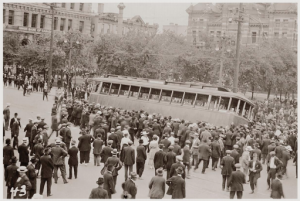
The Western Canadian Labour Conference convened in Calgary from March 13 to 15, 1919, to discuss common plans of action for union locals in the four Western provinces. The 239 voting delegates from labour councils were in an angry mood. Unemployment was deepening across Canada. The Canadian state, after assuming control over the economy in wartime, made no effort to plan the postwar economy. Munitions plants were abandoned rather than converted to peacetime use. Spooked by wartime debts, the federal government rejected spending to build infrastructure that could provide peacetime jobs. As the soldiers retuned and competed with non-combatants for a shrinking number of employments, the joblessness rate skyrocketed. Meanwhile, those in work, now dealing with employers who could easily replace them, failed to win wage increases to match inflation. A majority of workers had lived in poverty in the best of times while the corporate elite lived in opulence. Now conditions seemed worse than ever. So revolution was in the air.
The Calgary conference delegates wanted to change both the political and economic systems. They resolved that “the system of industrial soviet control by selection of representatives from industries is more efficient and of greater political value than the present system of government by selection from districts.” Indeed they expressed their “full acceptance of the principle of ‘Proletarian Dictatorship’ as being absolute and efficient for the transformation of capitalist private property to communal wealth.”
To strengthen the working class in its battle with capital the conference supported replacement of the “utter futility” of craft organization with “the immediate organization of the workers along industrial lines, so that by virtue of their industrial strength, the workers may be better prepared to enforce any demand they consider essential to their maintenance and wellbeing.”
The most radical proposal of the Western Labour Conference was to go beyond industrial organization and create “One Big Union.” Replacing separate unions with one organization, however that might be subdivided in practice, would create organizational solidarity of the working class and make sympathy strikes the norm for all strikes until capitalism had been overthrown. The IWW, founded in Chicago in 1905, pioneered the idea in their efforts to create an inclusive and revolutionary unionism. It had been picked up in wartime by the Socialist Party, who previously had focused more on education and voting than on workplace strategies in their advocacy of a socialist alternative to capitalism.
